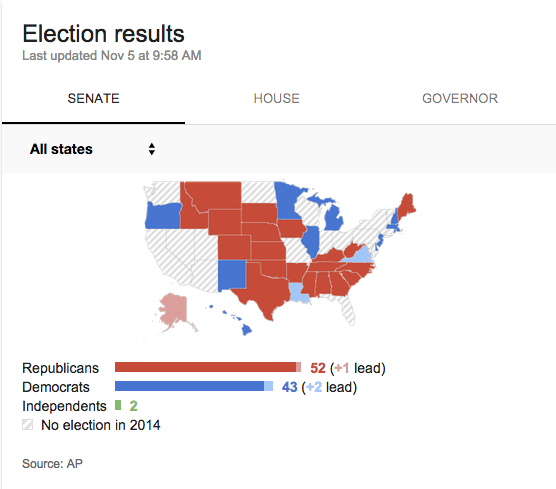
Yesterday, citizens across the country voted on who should represent them in Congress and in their state legislatures. The major news out of the elections is that the Republicans now control the United States Congress and Senate, for the last two years of President Barack Obama’s term. Republicans gained at least seven seats for a current total of 52 seats, while the Democrats lost, giving Republicans control of the senate. A few states, including Louisiana, are headed for a run-off election to determine the winner in December.
In the House of Representatives, the Republicans gained twelve seats, while the Democrats lost nine. The Republican Party has control of the House of Representatives and they maintained, and strengthened, their majority in the House. The Republicans needed 218 seats to establish a majority in the House – they now hold 235 seats. This seventeen seat surplus majority will make it difficult, if not impossible, for the House Democrats pass legislation.
Following trends of national elections, Republicans gained many gubernatorial seats in state elections. Republicans also won the gubernatorial races by large percentages in Illinois, Maryland, Florida, and Texas, a surprise upset for many pollsters. As a large portion of policy is made at the state and local levels, these races are crucial. Voters also had their say on a series of ballot initiatives, including supporting marijuana use passed in Oregon, Alaska, and Washington, DC, increasing the state minimum wage in Arkansas, Nebraska, and Alaska, and rejecting ‘Personhood’ abortion amendments in Colorado and North Dakota. Colorado rejected it for the third time. Tennessee however passed an amendment to their constitution that states that residents do not have the constitutional right to an abortion. California passed Prop 47, which reduces the penalties for small drug and theft crimes.
This election has significant implications for our nation. With a now GOP held legislature, President Obama will have to work with them to pass legislation including a jobs bill, immigration reform, and make decisions about the ongoing wars. I think it will be interesting to see what kind of legislation the Republican congress proposes and is successful in passing, especially because the current congress has the lowest approval rating in decades and has passed few bills. In addition, for the first time in our nation history there are one hundred women in serving congress. It will be interesting to see how policy changes as a result of female legislators.





